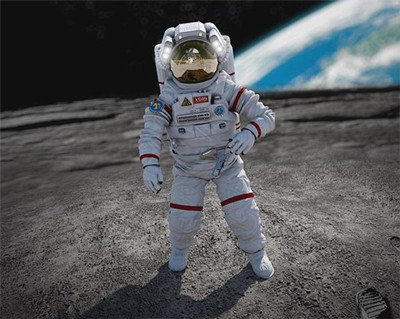(单词翻译:单击)
听力文本
This is Scientific American — 60-Second Science. I'm Karen Hopkin.
Got a minute?
Time spent in zero G changes the body: Astronauts come home with bone loss and muscle weakness. But what happens in their heads? To find out, researchers examined MRI's of astronauts' brains taken before and after flight. They looked at 12 astronauts who spent two weeks on the shuttle crew and 14 who spent half a year on the International Space Station.
What they saw is that the spacefarers' gray matter appeared compressed...particularly around the front and sides of the brain and the area around the eyes. That's probably due to a redistribution of cerebrospinal fluid, which is no longer being pulled down by gravity, the researchers say.

The exception to this compression is in a small area of the brain that controls the feeling in, and movement of, the legs. This region expanded in the astronauts—particularly the ones who spent six months circling the earth. That change, the researchers say, could reflect the formation of new neural connections as the brain tries to adapt to the weightless conditions. The study is in the Nature partner journal Microgravity.
The findings could have applications back here on terra firma. For example, we could learn more about treating the brain changes that take place in people who are on extended bedrest, with their feet elevated and thus higher than their heads.
The brain change is yet another thing that future space travelers, like those that may someday head to Mars, should keep in mind. No matter what size that mind may be.
Thanks for listening for Scientific American — 60-Second Science Science. I'm Karen Hopkin.
参考译文
这里是科学美国人——60秒科学。我是凯伦·霍普金。
有一分钟时间吗?
零重力状态会使人的身体发生改变:从太空归来的宇航员会出现骨质疏松和肌无力。那他们的大脑发生变化了吗?为了找到答案,研究人员检查了宇航员飞行前后的核磁共振脑图像。他们对12名在航天飞机上待过两周的宇航员以及14名在国际空间站工作了六个月的宇航员进行了研究。
研究人员发现,宇航员的大脑灰质好像减少了,大脑前部、两侧以及眼部周围的灰质缩小尤为明显。研究人员表示,这可能是因为脑脊液重新分布引起的,因为太空中没有重力,无法使体液向下流动。
而大脑中控制腿部知觉和活动的一小块区域却是个特例。宇航员脑中这一区域的灰质有所增加,这在环绕地球飞行六个月的宇航员身上尤为明显。研究人员表示,这种变化反映了大脑在试图适应无重力状态时形成了新的神经连接。该研究结果发表在《自然》期刊的合作伙伴《微重力》期刊上。
该研究结果也可以应用到地球上。举例来说,我们可以对特定人群大脑变化的治疗方法有更多了解,这些人长期卧床、双脚抬至高于头部的位置。
对于某天能登陆火星的未来时空旅行者来说,大脑变化仍是应牢记于心的另一件事。无论大脑的大小。
谢谢大家收听科学美国人——60秒科学。我是凯伦·霍普金。
译文为可可英语翻译,未经授权请勿转载!
重点讲解
重点讲解:
1. due to 由于;因为;
例句:All the buses are late due to heavy traffic.
因为交通拥挤,所有公共汽车都误点了。
2. no longer 不再;已不;
例句:That coal mine is no longer worked.
那个煤矿已经不经营了。
3. adapt to 适应;
例句:The athletes need to adapt to this environment.
运动员们需要适应这里的环境。
4. keep in mind 牢记;放在心上;
例句:Please keep in mind, not everyone who applies will be accepted.
请记住,并非每位申请人都将被接受。


